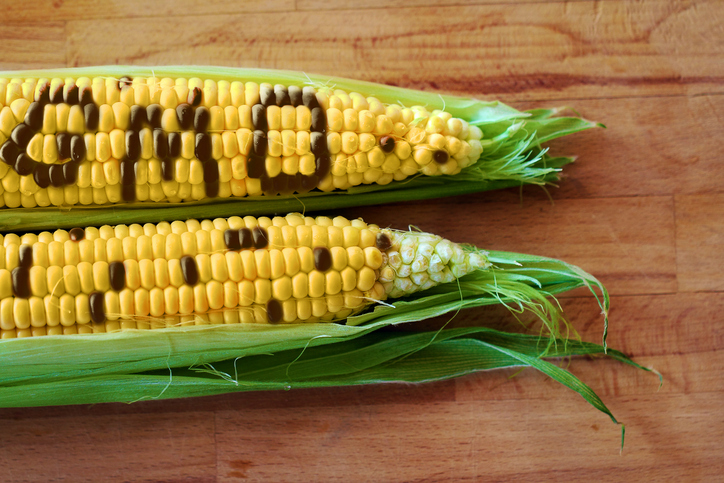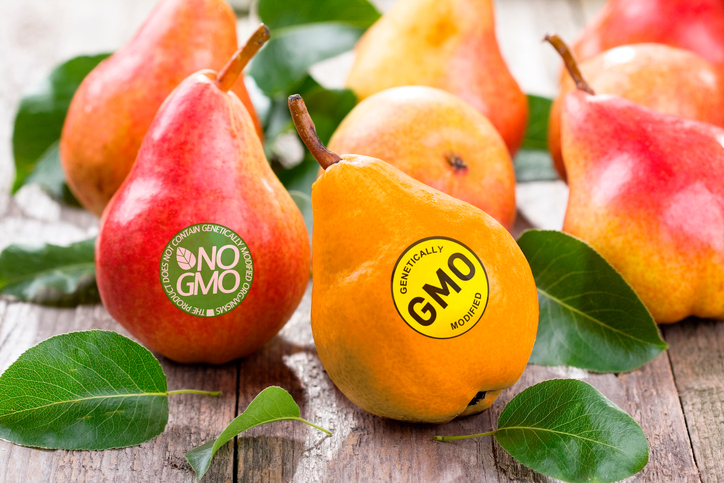Who doesn’t want the very best for their kids? This includes what we feed them.
In fact, we tend to be even MORE concerned about the quality of foods we give our children, since small developing bodies can be more susceptible to negative health effects from the things they consume.
Which is why you may want to take a closer look at the ingredient lists of your child’s favorite foods and watch for genetically modified organisms, or GMOs.
Kids can be especially vulnerable to the effects of GMO foods, but it isn’t on a lot of parents’ radar
So let’s start at the beginning, by giving you a basic overview of what we mean by GMO foods and how they can potentially impact you and your kids.

What’s a GMO?
A GMO (Genetically Modified Organism) is a laboratory process of taking genes from one species and inserting them into another in an attempt to obtain a desired trait or characteristic.
What Traits Are Added To GMO Foods?
- Foods can be altered to become herbicide tolerant crops, which allows farmers to spray weed killers directly on the crop without killing it.
- They can also be altered to become pesticide-producing crops, where the plant produces its own internal pesticide.
- In addition, foods can be altered for desirable traits, like not bruising or turning brown.
What Are The Most Common GMO Foods?
- Soy, canola, sugar beets, corn, Hawaiian papaya, milk, zucchini and yellow squash.
- Products derived from the above, including oils from all four, soy protein, soy lecithin, cornstarch, corn syrup and high fructose corn syrup.
- At least 80% of all products on supermarket shelves contain GMO ingredients.
Why Are GMO Foods A Potential Risk For Children?
Here’s the thing, when it comes to GMOs there’s a lot we don’t know.
While the U.S. government has said GMO Foods are safe to eat, 19 other countries have banned or placed severe restrictions on GMOs and the pesticides that go along with them. And the list of countries to ban GMOs continues to grow.
GMOs have been linked to allergies, various digestive issues, and in some animal feeding studies we’ve seen tumors, damaged immune systems and other issues.
Children face a greater potential health risk from GMO foods because:
- GMO effects can occur rapidly in fast-growing and developing bodies.
- Children are more susceptible to allergies and nutritional problems.
- Children are prone to issues with milk.
- Risks associated with antibiotic resistant diseases.
Effects On Growing Bodies
In GMO feeding studies released by the Institute of Responsible Technology (IRT), a world leader in genetically modified food and crop education, young rats on a GMO diet showed significant health damage to their immune systems and digestive function as well as displaying smaller brains, livers and cellular changes in their intestines.
While these study results have not been replicated on young humans, it’s still food for thought.
Is this something you want to risk with your own children? Parents must decide what makes sense for their family.
Allergies and Nutritional Problems
Children are three to four times more susceptible to allergies than adults.
GMO foods can boost allergic response, since they introduce foreign DNA into your system.
GM corn is particularly problematic for children as they generally eat a higher percentage of corn in their diet.
A 2002 report by the UK’s Royal Society, said that genetic modification “could lead to unpredicted harmful changes in the nutritional state of foods.” Meaning GMO foods may not have the same nutritional value as their non-GMO counterparts.
Milk Issues
That brings us to milk, and recombinant bovine growth hormone (rBGH). This is a genetically engineered hormone used to increase milk production in cows.
Milk and other dairy products from cows treated with rBGH contain a larger amount of the hormone IGF-1, one of the highest risk factors associated with breast cancer and prostate cancer.
RELATED: Is Eating Organic Worth The Hassle?
If that weren’t cause enough of concern, Sam Epstein, M.D., Chairman of the Cancer Prevention Coalition, writes, “rBGH and its digested products could be absorbed from milk into blood, particularly in infants, and produce hormonal and allergic effects.”
Antibiotic Resistance
Children who are prone to infections may be severely impacted if antibiotics lose their effectiveness due to antibiotic-resistant genes in GMO foods and the overuse of antibiotics in rbGH treated cows.
The British Medical Association cited this as one reason why they called for a moratorium of GMO foods.

What Can A Concerned Parent Do?
To help your kids avoid eating GMOs:
- Read labels and avoid buying processed food products containing corn, soy, canola, and vegetable oil.
- Look for the NON-GMO Project Label
- Get a copy of the Non-GMO Shopping Guide
- Buy USDA organic foods whenever possible
To make this task easier, you can buy products from a wholesale online market such as Thrive Market and have items shipped right to your door.
Thrive sells Non-GMO products that are natural and organic at wholesale prices, so you can save a little money to boot.
It’s a big help for busy moms that are picky about the ingredients they’ll feed their family, but don’t have the time to run all over town trying to find products that fit the bill.
SHARE the potential health risks you need to know about GMO foods and children with friends on Facebook and Pinterest by clicking the buttons below.












